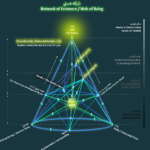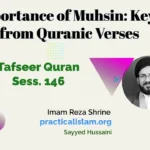Islamology; Islam and Violence

Main Subject: Islamology
Lesson 7: Islam and Violence 1
Lesson 8: Islam and violence 2
Number of slides: 23
Applied Knowledge in Islamology
Lessons 7 & 8: Islam and Violence
Lesson 7: Islam and Violence 1
The Relationship Between Islam and Violence
Islam’s approach to violence is often misunderstood. These lessons delve into topics such as jihad, slavery, and the justice system, shedding light on their true purpose and underlying philosophy.
Jihad: Types and Misconceptions
-
Defensive Jihad:
- Obligatory by human reason even before religion.
- Not an act of violence but resistance against tyranny and oppression.
-
Initial Jihad:
- On the surface, it appears as violence, but deeper reflection reveals its essence of compassion.
- Aimed at combating oppression and injustice, as dictated by reason and nature.
Conditions of Initial Jihad:
- Special conditions apply, with differing views on its application.
- Steps include argument, advice, and preaching; paying taxes to the Islamic government; and as a last resort, starting a war to prevent oppression.
- The spirit of jihad is compassion, akin to a parent correcting a child out of love.
A Historical Story on Jihad
During an early Islamic war, some prisoners were captured. The Prophet Muhammad (peace be upon him) smiled at the captives. One protested, and the Prophet explained, “Sometimes people are led to heaven with swords, chains, and ropes.”
ضحكت من قوم يؤتى بهم إلى الجنة في كبل الحديد
Islam and Slavery
-
History of Slavery:
- Early types: Selling family members and looting for income, both prohibited in Islam.
- War-related slavery remains, but Islam introduced progressive reforms.
-
Treatment of Prisoners:
- Options: Free, kill, imprison, or recruit prisoners.
- Recruitment benefits: Education, social integration, and contribution to society.
-
Guidelines in Islam:
- Oppression of slaves is forbidden.
- Freeing slaves is highly encouraged, with numerous examples from the lives of Imams.
- Imam Sajjad (peace be upon him) regularly freed slaves after training and educating them.
Example: Narjes Khatun, the mother of Imam Zaman (peace be upon him), was a prisoner of war.
Lesson 8: Islam and Justice Systems
Islam and Qissāss (Retribution) and Hudud (Limits)
- Purpose: These laws aim to guide the community, deter crime, and ensure societal balance. They are not tools of oppression.
- Implementation: Execution of these laws is rare due to strict conditions.
Examples of Conditions for Hudud:
- Theft requires 12 specific conditions to justify punishment, including the thief’s age, wisdom, and the circumstances of the theft.
وَلَكُمْ فِي الْقِصَاصِ حَيَاةٌ يَا أُولِي الْأَلْبَابِ
Forgiveness and Deterrence
- Islam encourages forgiveness; retribution is a right, not a mandatory law.
- The primary goal of these punishments is deterrence, similar to removing an infected limb to save the body.
Islam and Apostasy (Irtidād)
Common Misconceptions:
- Islam is against freedom and reasoning.
- Islam stifles thinking and questioning.
Reality:
- The Qur’an encourages reflection and reasoning:
- افلا تتفكرون
- لعلكم تعقلون
- The Prophet and Imams fostered intellectual growth and questioning.
Freedom in Islam:
- Absolute freedom is limited where it harms others or oneself.
- Examples include penalties for drug trafficking or mandatory safety regulations.
Philosophy of Apostasy Laws:
- Protecting society from intellectual and spiritual harm.
- Encouraging constructive criticism within acceptable boundaries.
Conclusion
Islamic laws on jihad, slavery, justice, and apostasy are rooted in compassion, reason, and societal betterment. While often misunderstood, these principles aim to create a balanced and humane society, promoting reflection, education, and justice.








